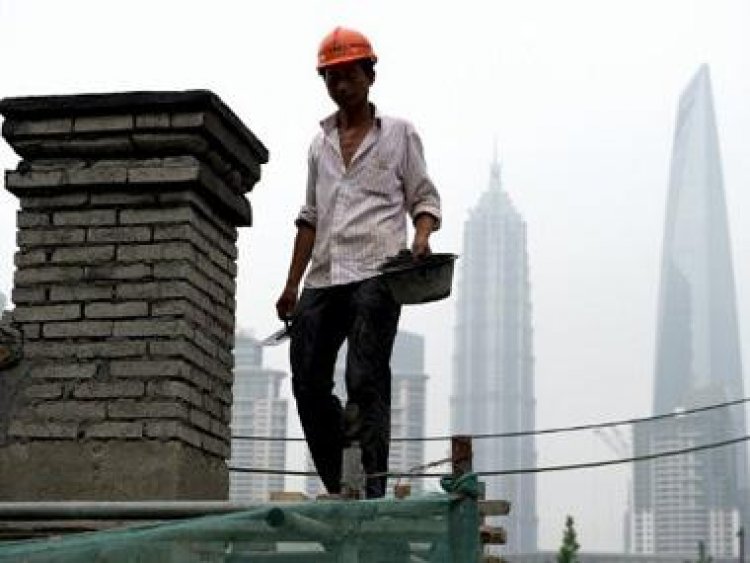Explained: Why Chinese homebuyers have stopped paying mortgages
Explained: Why Chinese homebuyers have stopped paying mortgages

In China, homebuyers who can take no more of postponed deliveries of pre-sold homes, unclear delivery times and halted construction have simply stopped paying their mortgages.
Homebuyers were last week reported to have halted payments for already sold units in at least 100 residential projects, according to data from industry groups and analysts.
Let’s take a closer look at what’s happening:
First, let’s understand how the system works.
In China, homebuyers take out mortgages on apartments that are under construction.
Over the past year, Chinese developers running short of funds have left construction projects in the lurch.
The current mortgage boycott is rooted in developers’ dependence on pre-sales for funding, Alicia García-Herrero, chief Asia-Pacific economist at French investment bank Natixis, tweeted on Friday.
"For households who have pre-paid unfinished units due to developers' defaults, it makes sense not to pay," she wrote.
“The boycotts appear to reflect growing concern among home buyers about the ability of indebted developers to deliver the homes they have sold, as well as some discontent about declines in new home prices, which have left many buyers sitting on paper losses,” Yahoo News quoted Julian Evans-Pritchard, senior China economist at Capital Economics as saying.
How bad is it?
Quite bad and getting steadily worse.
As per Fortune, as of 12 July, homebuyers in 22 Chinese cities had threatened to stop their mortgage payments over construction delays and sinking real estate prices, affecting 35 projects, Citigroup analysts wrote in a note.
As of Monday, that figure had surged to over 80 cities, affecting over 200 projects, according to data from E-house China Research and Development Institution, a Chinese real-estate database.
By Thursday, Bloomberg pegged that figure at least 301 projects in about 91 cities.
As per Bloomberg, around 70 per cent of China’s household wealth is in property – far more than in the US – making it one of the most sensitive political issues for the Communist Party.
“Chinese homebuyers usually pool the whole family’s resources to buy a home,” Alfred Wu, an associate professor at the National University of Singapore’s Lee Kuan Yew School of Public Policy told Bloomberg. “It is a life-and-death matter for them if their homes become negative assets.”
What do the banks say?
As per Bloomberg, Chinese banks have called the risks ‘controllable’, saying only 2.1 billion yuan ($311 million) of credit at risk. However, GF Securities Co. expects that as much as 2 trillion yuan of mortgages could be impacted by the boycott.
But the crisis could spread further.
On Thursday, Bloomberg reported that hundreds of contractors have complained that they can no longer afford to pay their own bills because developers including China Evergrande Group still owe them money.
One group of small businesses and suppliers circulated a letter online saying they will stop repaying debts after Evergrande’s cash crisis left them out of pocket.
“We decided to stop paying all loans and arrears, and advise our peers to decline any requests to be paid on credit or commercial bill,” the group said in the letter dated 15 July, which was sent to the developer’s Hubei office. “Evergrande should be held responsible for any consequence that follows because of the chain reaction of the supply-chain crisis.”
Chinese lenders urges banks to offer support
Meanwhile, China's banking regulator has urged lenders to extend more credit to real estate developers, as a growing number of homebuyers withhold mortgage payments on unfinished housing projects across 50 cities.
China's Banking and Regulatory Insurance Commission urged banks to "effectively meet the reasonable financing needs of real estate companies, vigorously support rental housing construction" and support project mergers and acquisitions, a representative said in a state media interview published Sunday.
They were also asked to "do a good job in customer service ... abide by contracts, fulfill commitments, and protect the legitimate rights and interests of financial consumers".
These measures were required to "maintain the stable and orderly operation of the real estate market", the unnamed official said.
Authorities launched a crackdown on excessive debt in the property sector in 2020, leaving giants like Evergrande and Sunac struggling to make payments and forcing them to renegotiate with creditors as they teetered on the edge of bankruptcy.
Regulators met banks last week to discuss the growing consumer mortgage boycott, Bloomberg reported, as more major Chinese developers teeter on the brink of default.
The developments come at a time of slowing growth for China and weak property sales, adding to the risk to stability ahead of the Communist Party's 20th Congress in the autumn, when President Xi Jinping is expected to be given a third term.
With inputs from agencies
Read all the Latest News, Trending News, Cricket News, Bollywood News,
India News and Entertainment News here. Follow us on Facebook, Twitter and Instagram.
What's Your Reaction?



























































